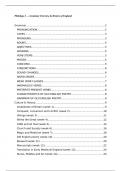Philology 2 — Grammar Overview & History of England
Grammar......................................................................................................2
PRONUNCIATION.......................................................................................2
CASES.......................................................................................................3
PRONOUNS................................................................................................3
NOUNS......................................................................................................4
ADJECTIVES...............................................................................................5
ADVERBS...................................................................................................5
VERB STEMS..............................................................................................5
MOODS......................................................................................................5
CONCORD.................................................................................................5
CONJUNCTIONS.........................................................................................6
SOUND CHANGES......................................................................................6
WORD ORDER...........................................................................................7
WEAK VERB CLASSES................................................................................7
ANOMALOUS VERBS..................................................................................8
PRETERITE-PRESENT VERBS......................................................................8
CHARACTERISTICS OF OLD ENGLISH POETRY...........................................8
GRAMMAR OF OLD ENGLISH POETRY........................................................9
Culture & History..........................................................................................9
Inhabitants of Britain (week 1)..................................................................9
Conquest, conversion and conflict (week 2)...........................................10
Vikings (week 3)......................................................................................11
Alfred the Great (week 4)........................................................................12
1066 and all that (week 5)......................................................................14
Church and Society (week 6)..................................................................16
Magic and Medicine (week 7)..................................................................18
Old English poetry (week 10)..................................................................20
Beowulf (week 11)..................................................................................20
Manuscripts (week 12)............................................................................22
Translation in Early Medieval England (week 13)....................................24
Runes, Riddles and Art (week 14)...........................................................24
,Grammar
PRONUNCIATION
Old English had 7 simple vowels (a, æ, e, i, o, u, y) and two diphthongs (ea, eo). Each of these
sounds came in short and long versions. Long vowels are marked with so-called macrons (ē,
ā) in modern editions. They were not marked like this in Old English manuscripts, though.
When speaking of vowel length, we speak of duration: how long it takes to pronounce a
vowel. Long-short vowel pairs are always qualitatively different. The difference in duration of
Old English vowel makes for a difference in meaning.
Vowels
- a as in ‘father’
- æ as in ‘cat’
- e as in ‘fate’
- i as in ‘feet’
- o as in ‘boat’
- u as in ‘tool’
- y as in ‘über”
- (ie as in ‘sit’)
Diphthongs
- eo starts with [e] and glides to a rounded sound like [o]
- ea starts with [æ] and glides to [ɑ] as in ‘father’
Consonants
Most consonants of Old English are the same as Modern English, with a handful of
exceptions:
- ϸ and ð were used interchangeably to represent [θ]
- There are no silent consonants.
- The consonants spelled f, s, and ϸ/ð are pronounced as voiced [v], [z], and [ð] when
they fall between vowels or other voiced sounds.
- These same consonants ^ were pronounced as unvoiced when they came at the
beginning or end of a word, or adjacent to at least one unvoiced sound.
- When written double, consonants must be pronounced double, or held longer.
- Undotted c is pronounced [k], dotted ċ is pronounced [ʧ]
- Undotted g is pronounced [g], dotted ġ is pronounced [j]
- The combination cg is pronounced [ʤ]
- Old English h is pronounced [h] at the beginning of syllables. Anywhere else it is
pronounced like German ch in ‘Nacht’.
- The combination sc is usually pronounced [ʃ]. If it occurs before a back vowel (a, o, u)
or after a back vowel at the end of a word, it is pronounced [sk].
, CASES
Nominative;
Subject.
Subject compliment. (“the sun is very broad”)
Direct address (“see, king, what kind of teaching this is”)
Accusative;
Direct objects of (transitive) verbs. (“his own sister buried his corpse”)
Objects of prepositions
Genitive;
Possessive
Partitive (“each of the men”). Expect to find the partitive genitive used with any word
that expresses number, quantity of partition. (“many men” or “twelve miles long”)
Descriptive (“of a white color”)
Objects of prepositions
Direct objects of verbs
Adverbial expressions of time
Dative;
Object of preposition (æfter, æt, be, fram, mid, of)
Interest
Indirect object (“give him his sword”)
Something taken away (“he took his bishopric away from him”)
Direct object
Possession (“theirs was a sad mind”)
Comparison (“and you will then be like the angels”)
Instrument, means, manner. In modern English it would be like ‘with’ or ‘by’.
(“therefore I will not kill him with a sword” or “you must die by a wretched death”)
Instrumental;
Instrument, means, manner. (“he therefore concluded his life with a beautiful end”)
Accompaniment.
Expression of time. Often formulaic. (“each day”, “in the same year”)
PRONOUNS
Personal pronouns
First-person pronouns are quite similar to
those of Modern English. The second-
person pronouns are not.
Old English does not use the second-person
singular as a ‘familiar’ form, like in Middle
English or French.




